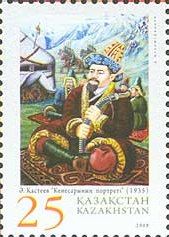This article relies largely or entirely on a single source. (April 2023) |
| Kenesary Qasymuly Кенесары Қасымұлы | |||||
|---|---|---|---|---|---|
| Khan of the Three Kazakh Jüzes Sultan | |||||
 Kenesary on the Stamp of Kazakhstan, portrait by Abilkhan Kasteev | |||||
| Khan of the Kazakh Khanate | |||||
| Reign | 1841—1847 | ||||
| Coronation | 1841 | ||||
| Predecessor | Ablai Khan | ||||
| Successor | Khanate abolished | ||||
| Born | 1802 Modern Kokshetau, Kazakhstan | ||||
| Died | 1847 (aged 45) locality Maitobe, modern Kyrgyzstan | ||||
| Spouse | Kunymzhan Khanym Janyl Khanym | ||||
| Issue | Syzdyk Sultan | ||||
| |||||
| House | House of Borjigin | ||||
| Dynasty | Töre | ||||
| Father | Kasym Sultan | ||||
| Mother | Aikumis | ||||
| Religion | Sunni Islam | ||||
Kenesary Qasymov, or Kenesary Qasymuly, Kenesary Khan (Kazakh: Кенесары Қасымұлы, romanized: Kenesary Qasymūly) was the last khan of the Kazakh Khanate, grandson of Ablai Khan, from the clan of Genghisid-Tore.[1]
In modern Kazakhstan, he is revered at the state level as the leader of the National Liberation Movement of the Kazakhs in 1837–1847 for Independence from the Russian Empire. In Soviet historiography, Kenesary was characterized as the leader of the reactionary feudal-monarchist movement aimed at separating Kazakhstan from Russia.[2]
- ^ Kazakhstan. National encyclopedia
- ^ Кенесары Касымов // Большая советская энциклопедия : [в 30 т.] / гл. ред. А. М. Прохоров. — 3-е изд. — М. : Советская энциклопедия, 1969—1978.